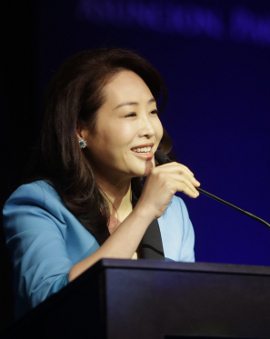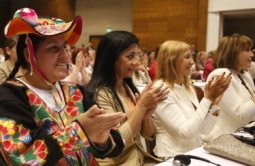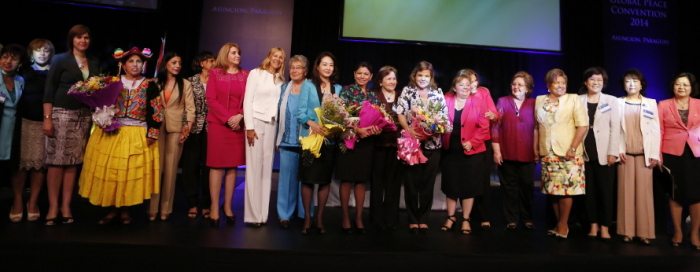“Peace starts in the home!” Global Peace Women Chairwoman Dr. Jun Sook Moon declared, calling on more than 1,000 participants of the first Women’s Panel at the 2014 Global Peace Convention to recite the phrase with her. “In the home peace is more than a concept or ideal, it is visible.”

Global Peace Women Chairwoman Dr. Jun Sook Moon addresses 1,000 women leaders at the special women’s plenary during the Global Peace Convention 2014.
Seven distinguished women leaders from across Latin America and beyond contributed to the panel, Women’s Leadership in National Transformation, hosted as part of the 2014 Global Peace Convention in Asuncion, Paraguay.
“Failure to invest in the family is the same as doing nothing to prevent family breakdown,” Dr. Moon said adamantly. In order to create ethical, prosperous societies, families must be strong and serve as a school of values, she said. As essential matriarchs and “hearts” of the family, women especially must be empowered by their society in order to take on the role of teacher and leader, not just for their children and extended family, but for their communities, nation, and world.
The International Director of Global Peace Women, Cristina Jaesoon Field, reflected on the nature of women, observing that “the heart of a woman . . . is the most powerful force that can unite the family and society.” Described as an often untapped “human resource,” the very nature of women, specifically motherhood, exemplifies empathy, compassion, and the ability to look at a bigger picture; identifying the best course of action for the entire family, not the individual.
These characteristics are essential in leadership, especially in the process of transforming deeply embedded social concepts. Paraguayan National Senator Lilian Samaniego called for the establishment of new social and political strategies to demonstrate tolerance on a national level, moving forward with a common agenda. She recognized the value of empathy and understanding the needs of others in order to “give value to our cultures and families,” ultimately leading to the “construction of the culture of service here in Paraguay.”

Among the many women leaders (left to right) Ms. Sanchez, CEO Zambrano Foundation, Mrs. Guldenzoph, Global Peace Women Uruguay, Gov. Ocampos of Alto Paraguay, and Congresswomen Coari from Peru.
Making up half of the world’s population, women throughout history have not been recognized for their capacity or taken on the responsibility that is required of them for the establishment of a peaceful world. Hoping to shed a positive light on the issue, the former President of Costa Rica, Laura Chinchilla, encouraged her female compatriots to embrace their inner strength. President Chinchilla called on society to use “the soul of women” for social development, furthering gender equality in roles of leadership.
A perspective repeatedly revisited by panelists was that the family is at the center of national transformation. “We are all leaders because the family is directed by the woman.” Ms. Ana Maria Baiardi, Minister of Women in Paraguay, told the assembled women.
Ms. Field reflected on the value of experience within the family, saying that it is “through experience that one becomes the owner of knowledge.” The basic principles and values that are instilled in us as young children, she said, are provided through the family unit and ultimately determine our contribution to our society and world. The distinguished women leaders appealed to the audience to look towards the family not only as a private sphere of life but as intrinsically public, with essential relevance to society. In order to promote national transformation every society must take ownership of the family unit as an essential component of a healthy society, nation, and world. Ms. Baiardi looked out soberly among the gathered women, stating, “We are all responsible here.”

Speakers of the Global Peace Women Plenary (left to right): Dr. Jun Sook Moon, Chairwoman, Global Peace Women; Hon. Lilian Samaniego, National Senator of Paraguay; H.E. Laura Chinchilla, former president of Costa Rica; Ms. Maria Ester Jimenez, Global Peace Women Paraguay; Ms. Ana Maria Baiardi, Minister of Women in Paraguay; Cristina Jaesoon Field, International Director of Global peace Women-Latin America; and Ms. Shinsook Kwak Kim, General Secretary of Global Peace Women International
Also addressing the women’s panel were the President of Global Peace Women-Paraguay, Ms. Maria Ester Jimenez; and Ms. Shinsook Kwak Kim, General Secretary of Global Peace Women International.
The 2014 Global Peace Convention: Roadmap for National Transformation: Liberty, Prosperity and Integrity through Moral and Innovative Leadership, concludes on November 21.
 The original article can be found at globalpeace.org
The original article can be found at globalpeace.org
